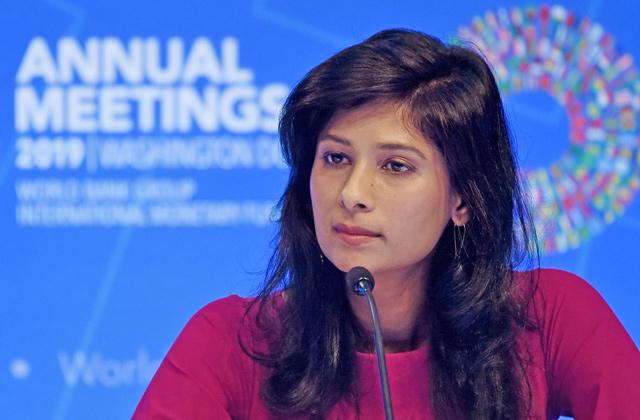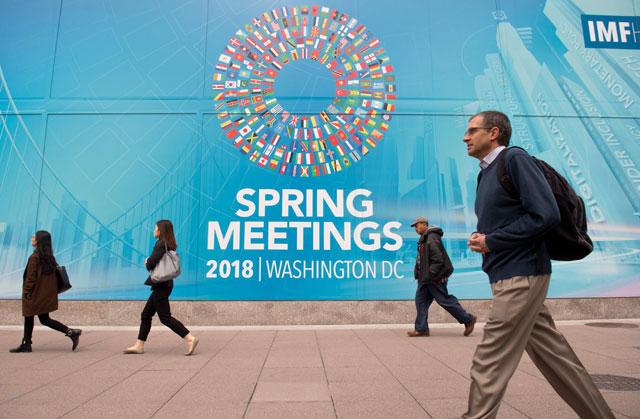You are here
IMF trims global growth estimates 2020-21 but sees improving outlook
By AFP - Jan 20,2020 - Last updated at Jan 20,2020
WASHINGTON —Improving US-China trade tensions have eased uncertainty and the world economy may have hit bottom but a sharp slowdown in India is creating a drag worldwide, the International Monetary Fund (IMF) said on Monday.
However, while the risks to the global economy have lessened, the Washington-based global lending institution cautioned that outcomes "depend to an important extent on avoiding further escalation" between Washington and Beijing.
In the latest update to its World Economic Outlook, the IMF cut the global growth estimate for 2020 by one tenth compared to the prior report released in October, dropping to 3.3 per cent.
It also lowered the 2021 forecast by a bit more to 3.4 per cent.
The sharp drop for India "accounts for the lion's share of the downward revisions", the IMF said.
The relationship between China and the United States, the world's dominant economic powers, is still troubled by "unresolved disputes" which continue to be a factor.
"The risk of protracted subpar global growth remains tangible despite tentative signs of stabilising momentum," the fund warned in its quarterly report.
"Policy missteps at this stage would further enfeeble an already weak global economy."
US President Donald Trump signed a deal with China last week that ends the escalation but leaves in place tariffs on two thirds of the goods imported from the Asian economic power.
The trade truce led to an upgrade of China's growth forecast to 6 per cent in 2020, with a slight slowdown to 5.8 per cent projected for next year.
But the giant Asian economy has been on a steadily slowing path for some time.
Meanwhile, the IMF trimmed US growth just a tenth to 1.6 per cent this year, with a repeat expected in 2021.
Since 2018, Washington and Beijing have exchanged tit-for-tat tariffs on hundreds of billions of dollars in two-way trade.
IMF chief Kristalina Georgieva on Friday said the two countries still have a long way to go to resolve their trade disputes — although the partial deal signed last week is a step forward.
"Trade truce is not the same as trade peace," she said.
In its previous analysis, the IMF had estimated that trade conflicts and tariffs cut 0.8 percentage points off of global growth.
But two thirds of that damage was not due to the tariffs but to trade uncertainty created by the conflict, which causes companies to put the brakes on investment.
If tensions flare again, or if Trump's trade dispute with the European Union or confrontation with Iran should worsen, that too could undermine the "nascent bottoming out of global manufacturing and trade, leading global growth to fall short" of forecasts, the report said.
Slowing growth in India
Receding risks of a hard Brexit have helped stabilise the outlook for Britain and the European Union. Healthy private consumption have helped the still-slow but upgraded growth prospects in Japan.
However, the IMF once again slashed expected GDP growth in India by 1.2 points this year and 0.9 percentage point in 2021 compared to the October forecasts.
While growth remains relatively robust at 5.8 and 6.5 per cent for the two years respectively, it is not enough to continue to reduce poverty in the growing south Asian economy.
That nation has been one of the fastest growing in the world and a major engine of global expansion, together with China, as advanced economies have bumped along at far slower rates.
But it had already been downgraded in October due to a bigger-than-expected decline in domestic demand amid growing stress in the financial sector.
Meanwhile, Latin America continues to slow, even as Brazil has stabilised and growth there was upgraded.
Mexico was downgraded, while Chile suffered "a sizable markdown" amid widespread social unrest.
Related Articles
WASHINGTON — The International Monetary Fund (IMF) has slightly upgraded its outlook for global growth this year on the back of resilient se
WASHINGTON — The world economy is slowing to its weakest pace since the global financial crisis, as the US-China trade war undercuts busines
WASHINGTON — The global economy is expected to grow at a solid pace through next year, boosted by faster expansion in the United States and














